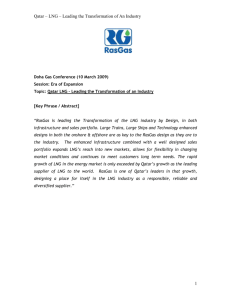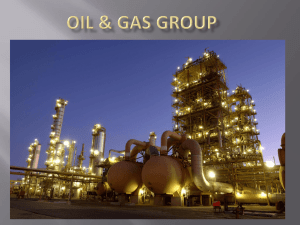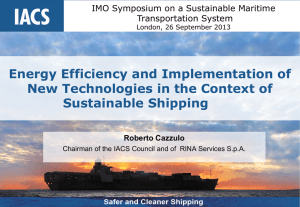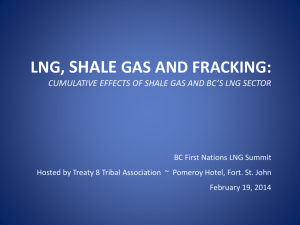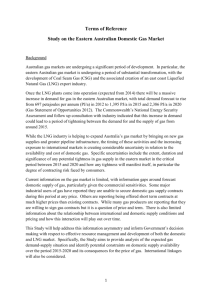take action! - Yukon Conservation Society
advertisement
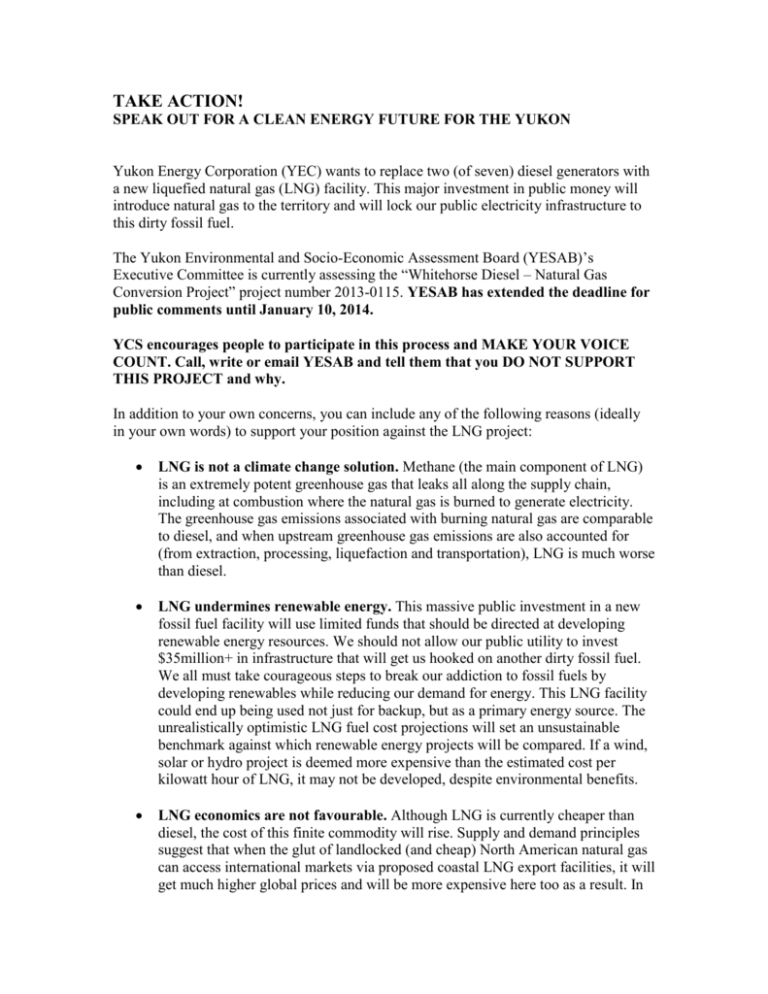
TAKE ACTION! SPEAK OUT FOR A CLEAN ENERGY FUTURE FOR THE YUKON Yukon Energy Corporation (YEC) wants to replace two (of seven) diesel generators with a new liquefied natural gas (LNG) facility. This major investment in public money will introduce natural gas to the territory and will lock our public electricity infrastructure to this dirty fossil fuel. The Yukon Environmental and Socio-Economic Assessment Board (YESAB)’s Executive Committee is currently assessing the “Whitehorse Diesel – Natural Gas Conversion Project” project number 2013-0115. YESAB has extended the deadline for public comments until January 10, 2014. YCS encourages people to participate in this process and MAKE YOUR VOICE COUNT. Call, write or email YESAB and tell them that you DO NOT SUPPORT THIS PROJECT and why. In addition to your own concerns, you can include any of the following reasons (ideally in your own words) to support your position against the LNG project: LNG is not a climate change solution. Methane (the main component of LNG) is an extremely potent greenhouse gas that leaks all along the supply chain, including at combustion where the natural gas is burned to generate electricity. The greenhouse gas emissions associated with burning natural gas are comparable to diesel, and when upstream greenhouse gas emissions are also accounted for (from extraction, processing, liquefaction and transportation), LNG is much worse than diesel. LNG undermines renewable energy. This massive public investment in a new fossil fuel facility will use limited funds that should be directed at developing renewable energy resources. We should not allow our public utility to invest $35million+ in infrastructure that will get us hooked on another dirty fossil fuel. We all must take courageous steps to break our addiction to fossil fuels by developing renewables while reducing our demand for energy. This LNG facility could end up being used not just for backup, but as a primary energy source. The unrealistically optimistic LNG fuel cost projections will set an unsustainable benchmark against which renewable energy projects will be compared. If a wind, solar or hydro project is deemed more expensive than the estimated cost per kilowatt hour of LNG, it may not be developed, despite environmental benefits. LNG economics are not favourable. Although LNG is currently cheaper than diesel, the cost of this finite commodity will rise. Supply and demand principles suggest that when the glut of landlocked (and cheap) North American natural gas can access international markets via proposed coastal LNG export facilities, it will get much higher global prices and will be more expensive here too as a result. In contrast, free-fuel renewable energy sources such as wind, solar, hydro and biomass will not lock us to the fluctuating market prices of finite fossil fuels. The alternatives to this project are better than LNG. Developing renewable energy sources to add baseload capacity to our electrical system will eliminate the need to burn fossil fuels when there is a high energy demand on the system. Refurbishing or replacing old diesels with new efficient diesels won’t require completely new infrastructure and expertise (technicians, mechanics, operators, emergency responders, etc.) as would be needed for LNG. Along with developing wind, solar, low-impact hydro and biomass projects, ambitious conservation and efficiency programs must reduce our demand for electricity and shift that demand from peak times. Diesel is better for backup than LNG. By definition, backup is rarely used. LNG must remain at -162 degrees Celsius in storage, and as it sits, some of this fuel vapourizes. This “boil off gas” must be regularly vented, flared or burned, whether electricity is needed at the time or not. This can result in emissions and wasted energy. Diesel does not have this issue, and as a result is a more stable fuel in storage. Diesel can be more easily turned on and off, making it a better for backup. Burning any fossil fuel as a primary energy source to meet growing industrial, commercial and residential baseload demand should not be allowed. Air emissions won’t necessarily be reduced with LNG compared with diesel. Studies show that while some air pollutants decrease from burning LNG compared to diesel, other air pollutants increase. Burning natural gas also results in increased water vapour that causes ice fog in winter. There are unanswered questions about how the increased emissions from burning LNG (carbon monoxide, volatile organic compounds and methane) would interact with emissions from the remaining diesels, especially considering increased ice fog and temperature inversions that the area is prone to. Location. The proposed location is in close proximity to residential areas, energy infrastructure and transportation routes (Erik Nielsen Whitehorse International Airport air traffic approach, the float plane base, Riverdale, Downtown, Whitehorse Rapids Hydro Dam, Robert Service Way, campground, baseball diamond, Millenium Trail, mud bog pit, etc.). It is not clear how these values and activities could impact the facility and how the facility could impact these values, especially in the event of an emergency. Traffic patterns. The proponent plans to employ specially designed oversized trucks to bring LNG to the proposed facility. What impact would these trucks have on traffic flow and safety at the bottom of Robert Service Way? Additional Costs. What would be the costs associated with ensuring that emergency responders all along the transportation route and in the City of Whitehorse are trained and equipped to handle emergencies such as truck accidents, leaks, spills or fires at the LNG facility? What are the costs associated with ensuring the intersection at South Access is safe for LNG trucks, active commuters and commuting traffic? LNG requires fracking. LNG is natural gas that has been cooled in an energy intensive process called liquefaction that turns the gas to a liquid at -162 degrees Celsius. A common method of extracting natural gas from the ground is hydraulic fracturing or “fracking”. Fracking has been shown to cause wide ranging and devastating impacts on the environment and communities. If our public utility burns LNG to meet our growing electricity needs, YCS is deeply concerned that a fracking industry will become established in the Yukon to supply this market. Please Note: YESAB has said it will not include fracking or upstream impacts of natural gas extraction and processing in the scope of its assessment. If you are concerned that this project will open the door to fracking in the Yukon, by all means mention it, but do not make it the sole focus of your comment submission. YCS does not support this project. The proponent has not presented adequate evidence to suggest this is a socially, environmentally and economically sustainable project. Alternatives exist, in the form of renewable energy, and efficiency and conservation strategies, that YEC must pursue to ensure a sustainable energy future for the Yukon. Thank you for participating in this process. You can find more information about the project proposal and about the YESAB Executive Committee Screening process at www.yesab.ca. Search the project number 2013-0115 on the YESAB Online Registry to read other great comment submissions from Yukon people. Please send your comments to: yesab@yesab.ca YESAB Head Office Suite 200-309 Strickland Street, Whitehorse, Yukon, Y1A 2J0 (867) 668-6420 or toll free 1-866-322-4040
